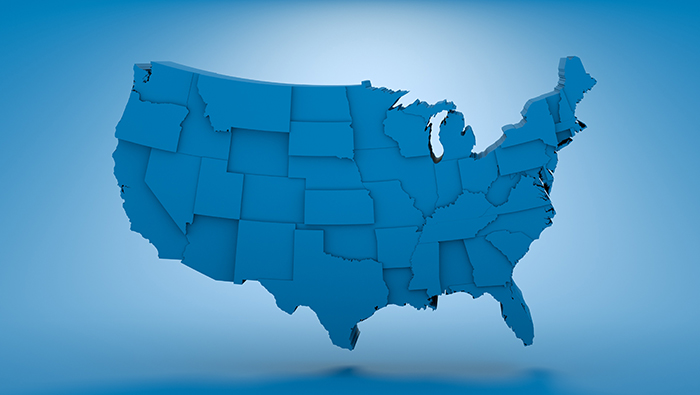Personnel Concepts provides timely state legislation and essential employment law information to its customers. So, to offer a complete scope of employer responsibilities, we track labor law developments from all 50 states. Below is a list of findings from this week’s state legislation research sweep. Most importantly, as necessary information becomes available, Personnel Concepts will continue to provide updates to affected small businesses.
Arizona
On April 5th, 2021, Governor Doug Ducey signed Arizona Senate Bill (S.B.) 1377 into law. SB 1377 acts as a pandemic-related liability shield and is retroactive to March 11th, 2020. Accordingly, the new piece of state legislation covers the following businesses and industries:
- Entities that furnish consumer or business goods or services or entertainment;
- Educational institutions or districts;
- School districts or charter schools;
- Property owners, property managers, or property lessors or lessees;
- Nonprofit organizations;
- Religious institutions;
- The entire state of Arizona or an agency or instrumentality of the state;
- A local government or political subdivision of the state. For instance, any department, agency, or commission of a local government or political subdivision of the state.
- Health care institutions as defined in Arizona Revised Statutes, Section 36-401.
- Service providers as defined in Arizona Revised Statutes, Section 36-551.
- Health professionals as defined in Arizona Revised Statutes, Section 32-3201.These include any person who the health professional supervises when providing health care services.
The signing of state legislation SB 1377 follows the launch of a recent federal Occupational Safety and Health Administration program. Similarly, the federal program also focuses on workplace safety during the COVID-19 pandemic.
California
Approved on March 19th, 2021, California’s expanded COVID-19 Paid Sick Leave Law took effect on March 29th, 2021. This state legislation is retroactive for all occurrences of COVID-19-related sick leave taking place on or after January 1st, 2021. Additionally, the expanded law now expires on December 31st, 2021. Above all, employers with 25 or more employees must provide 80 hours of supplemental paid sick leave for employees:
- Subject to quarantine or isolation as defined by orders or guidelines from a public agency. Specifically, those agencies can include:
- the State Department of Public Health;
- the Centers for Disease Control and Prevention; or
- a local health officer due to COVID-19;
- Advised by a health care provider to self-quarantine due to COVID-19;
- Attending an appointment to receive a COVID-19 vaccine;
- Experiencing symptoms after receiving a COVID-19 vaccine that prevents the employee from being able to work;
- Showing signs of COVID-19 and seeking a medical diagnosis;
- Caring for a family member who is subject to quarantine or isolation due to COVID-19; or
- Solely caring for a child whose school or place of care is closed for reasons related to COVID-19.
Previously, in January 2021, the U.S. Department of Labor provided updated guidance on federal COVID-19 paid sick leave provisions. California employers, however, should review the new state-provided paid sick requirements and update their policies accordingly.
Illinois
The Illinois Legislature recently amended its Equal Pay Act (IEPA) with state legislation involving employers with 100 or more employees. Under Illinois Senate Bill (S.B.) 1480, affected employers need to generate specific EEO reports detailing their compliance with IEPA regulations. That is to say, if these reports do not prove compliance, employers can face and penalties.
Proof of compliance with the IEPA includes:
- Proving compliance with Title VII of the Civil Rights Act of 1964 and the federal Equal Pay Act. Additionally, employers must comply with the IEPA, the Illinois Human Rights Act, and the Illinois Equal Wage Act.
- The average compensation of minority and female employees is “not consistently below” the average wage of non-minority and male employees. Calculations allow for factors such as length of service, experience, skillset, responsibilities, etc.
- Not making employment decisions based on sex and not restricting employees of one sex to specific positions.
- When identified, correcting any wage and benefit disparities to comply with applicable laws.
- Examining the wages and benefits of employees regularly to identify any disparities.
SB 1480 will go into effect on March 23rd, 2024.
Recently, the U.S. Department of Labor (DOL) has continued to crack down on equal pay discrimination claims. For example, in February 2021, the DOL reached a settlement with Google LLC to resolve compensation discrimination allegations.
New York
On March 31st, 2021, New York State passed the Marijuana Regulation and Taxation Act, legalizing the recreational use of marijuana. Accordingly, with the new state legislation passing, N.Y. Labor Law Section 201-D now includes recreational cannabis use. As a result, employers now cannot:
- discriminate against,
- terminate,
- refuse to hire,
- employ, or
- license individuals due to legal use of consumable products or participation in legal recreational activities outside of work.
Virginia
Signed by Governor Ralph Northam, the Virginia Overtime Wage Act (Act) goes into effect on July 1st, 2021. The state legislation contains a definition of overtime payment calculations that largely mirror the federal Fair Labor Standards Act (FLSA). However, the Act dramatically differs in exemption misclassification cases under Virginia state law. Virginia employers should learn of this change in repayment calculations, as violations can increase their risk of fines and penalties.
Recently, in January 2021, the U.S. Department of Labor (DOL) increased civil monetary fines and penalties for violating DOL-governed laws. Specifically, these DOL laws include those that control federal minimum wage and overtime. Since Virginia’s new Act borrows from the FLSA, employers should be familiar with both regulations to stay in compliance.

